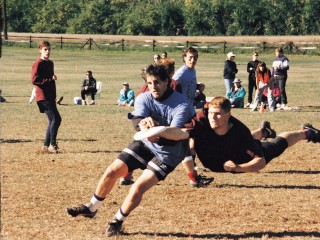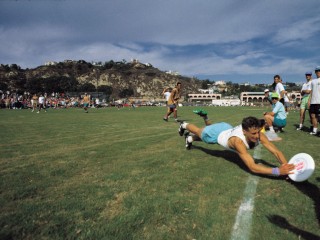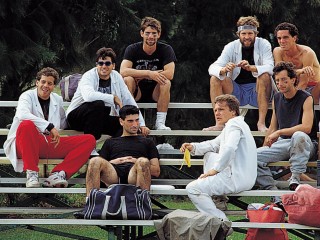There was a time when the governance of the sport was divided into two bodies: the coordinating committee (CC), which decided player-related issues, and the board of directors, which decided business-related issues. This was actually more complicated than it sounds because some members of the board were not technically on the CC. But it would be silly, for example, to exclude the national college director (NCD), who was not part of the CC, from a vote on college eligibility. But should the high school director have a vote on college issues? The result was that we would often have a small debate about who should be allowed to vote on a particular issue.
Sometime in the late 1980s, Executive Director Robert “Nob” Rauch proposed a very sensible idea: open up the title of “official disc” and let disc manufacturers submit proposals. At the time, Wham-O had been quietly supporting the UPA since its inception, despite the fact that they got almost no recognition or credit for it. Their support, thanks to Dan “Stork” Roddick, was in the form of discs and other merchandise to the UPA.
Stork believed that the best way to support ultimate was through its governing body and to let the governing body decide what best to do with the funds. This was great for the sport, but it resulted in poor public relations for Wham-O. A tournament director (TD) would call up Wham-O and ask them to buy an ad in their program, and Wham-O would tell the TD that they already supported ultimate. Then the TD would call up Discraft, who was more than happy to take out an ad. With that kind of situation, Discraft built up some nice grassroots support.
In the meantime, the process of requesting bids from disc manufacturers had begun and a UPA committee had formed to set technical standards for acceptable discs. Finally, at the January 1988 Annual Meeting, the UPA was ready to make its decision on selecting an “official disc.” The first question, of course, was: Who gets to vote on this? If ever there was a decision that was both player-related and business-related, it was this one. After some discussion, it was decided to let everyone in the room—all 13 of us—vote. The old timers noticed that both Wham-O’s and Discraft’s bids were worth approximately twice what Wham-O had given us just the year before. Nob’s plan paid off and was already a success, no matter what we decided.
After some discussion, it was apparent that most of the older players, in part due to a sense of loyalty and appreciation for their support in the past, wanted to keep Wham-O, while the newer, younger players leaned towards Discraft. The split in the group was even.
The tie-breaking position was firmly voiced by Mark Licata, who led the disc selection committee and worked at the time in the plastics industry. Licata was part of the Pittsburgh group who had run the 1987 Mid-Atlantic Regionals that was a disaster for many reasons. There were torrential rains, cold weather, and revoked field permits that necessitated last minute field changes; the club was left having to spend somewhere around two thousand dollars to repair the fields afterwards.
As any tournament director will tell you from that era, there was only one way to break even at such a tournament, and that was to sell discs. Wham-O had recently begun manufacturing some of their discs in Mexico; the discs ordered for this tournament had arrived in horrible condition—they were “domed.” They were essentially unplayable and useless. The club had to send the discs back and took a huge financial loss.
Licata thus held a pretty clear and strong opinion on this issue. “We need to send Wham-O a message,” he said, “that quality control matters.” The fact of the matter, he argued, is that their discs of late had just been too inconsistent in quality, and that he was voting for Discraft.
Licata’s impassioned speech was enough to sway the undecided votes of National College Director Frank Revi and longtime legal counsel and former ED, Brian Murphy.
And there it was: The first ever bid process resulted in a 7-6 vote for Discraft. Ultimate, since its birth, had been played with Wham-O discs, and had had a relationship with Wham-O, the IFA and Dan Roddick. And now, because of who happened to be at that meeting and because of a badly manufactured Regionals’ disc, we were ending an era and moving into uncharted territory.








Comments Policy: At Skyd, we value all legitimate contributions to the discussion of ultimate. However, please ensure your input is respectful. Hateful, slanderous, or disrespectful comments will be deleted. For grammatical, factual, and typographic errors, instead of leaving a comment, please e-mail our editors directly at editors [at] skydmagazine.com.